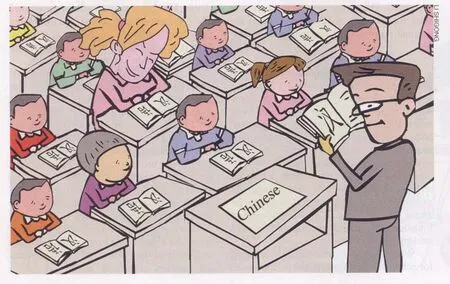A Humble Approach to Mandarin
By BRIANNA ZHANG
A Humble Approach to Mandarin
By BRIANNA ZHANG
I have always wanted to learn another language. As a kid, my cousin and I would speak in our own made-up language and pretend that we understood each other.
In an effort to fulfll my goal, I had my go at Spanish. My high school required a foreign language and Spanish was the only option. I tried to connect with the language, but I could not fnd the motivation to really focus.
My next language attempt was Portuguese. I was headed to Brazil and felt learning a little Portuguese would make my experience better. However, much like Spanish, I had a hard time connecting to the language because I could not see the value. It is important to express at this moment that I was too young and naïve to understand the power of understanding a second language.
After my failed attempt at two languages, I almost began to feel that I did not have the gift or ability to grasp another language. Asian languages have always piqued my interest but I felt the language was too complicated so I would not even let myself consider the option. After all, I had heard many times that Mandarin was one of the hardest languages to learn. I began to spend a lot of time with Mandarin speakers and I became fascinated with the characters and sounds. I started to entertain the possibility of learning Mandarin but did not know how to approach the language. I thought about self teaching but knew I would fail miserably. I was able to find a local Mandarin teacher that charged a reasonable rate and had many years of experience teaching in several different countries.
I was finally ready to start taking Mandarin classes. The initial meeting with the teacher went very well and I was so excited to be learning Mandarin or at least I thought that the third language would be the charm.
I was to arrive to the class the following Sunday. My Mandarin class was held at the teacher’s home. For my frst day of class, I was nervous and curious about my other classmates. To my shock, the class was flled with six- and seven-year-old Chinese kids. These Chinese kids were from homes where Mandarin was likely spoken all of the time and their parents wanted them to receive formal instruction.
At the time, I was 23 years old with only a one-expression vocabulary—nihao (hello). I almost wanted to run out of the door and save myself the embarrassment of learning the language with super advanced elementary school kids. However, I decided to give it a try.
My boyfriend at the time, now my husband, is from Guangdong. I relied heavily on him to help reduce my embarrassing moments by helping me to pronounce the phrases correctly before each class. Sadly, I completely humiliated myself when I said pigu (buttock), by which I meant pingguo (apple). I really thought I was correct but the laughter reassured me that my reply was wrong.
EXPATS, WE NEED YOUR STORIES!
If you’re an expat living in China and have a story or opinion about any aspect of life here, we are interested to hear it. We pay for published stories. Submissions may be edited. E-mail us at contact@ bjreview.com.cn Please provide your name and address along with your stories.
I am sure my classmates were often times annoyed with my way of making simple things complicated, such as why can’t ge be used as a measure word for everything, what each part of the character meant and how was that character derived? In fact, I am quite sure I could feel them rolling their eyes. In order not to get on their bad side, I decided to hold my questions until after the class ended.
Our teacher wrote short plays, which included some singing and dancing, for us to use our vocabulary learned over the semester. I would reluctantly participate as my teacher felt I should and would not take no for an answer. I could only imagine what the audience thought and more importantly what my future husband was thinking. (I really think my dedication to learning the native language was enough to make him love me even more).
Looking back on my elementary Mandarin class, I am very grateful to have spent at least two years with these kids. They certainly kept me on my toes and make me work harder. After all, what selfrespecting adult wants to be embarrassed by young kids? I picked up the language and began to understand parts of conversations. I was so excited not only to understand but to have fulflled my childhood wish. I know that my learning experience may have been much different if I had taken an adult course but then I would not have had such colorful memories.
I have come to understand that maybe it is best to start learning a new language the way a child would learn. In fact, I would highly recommend it. One piece of advice: Be prepared to smile until your face hurts because you will have the best time singing cute songs and rhymes.

The author is an American living in Florence, South Carolina
